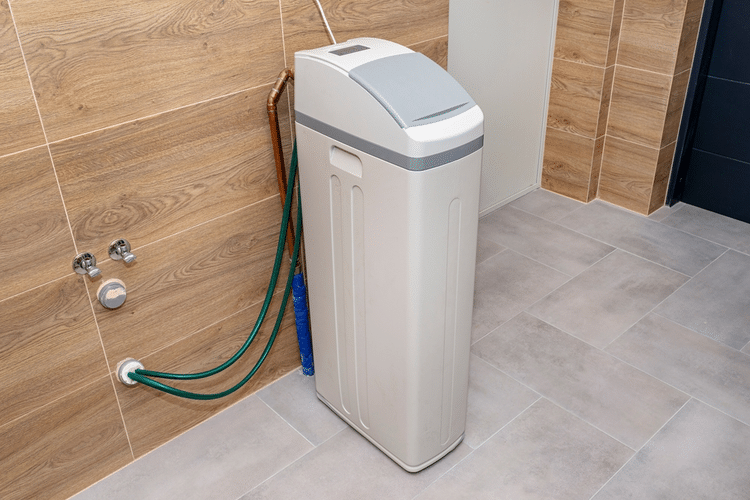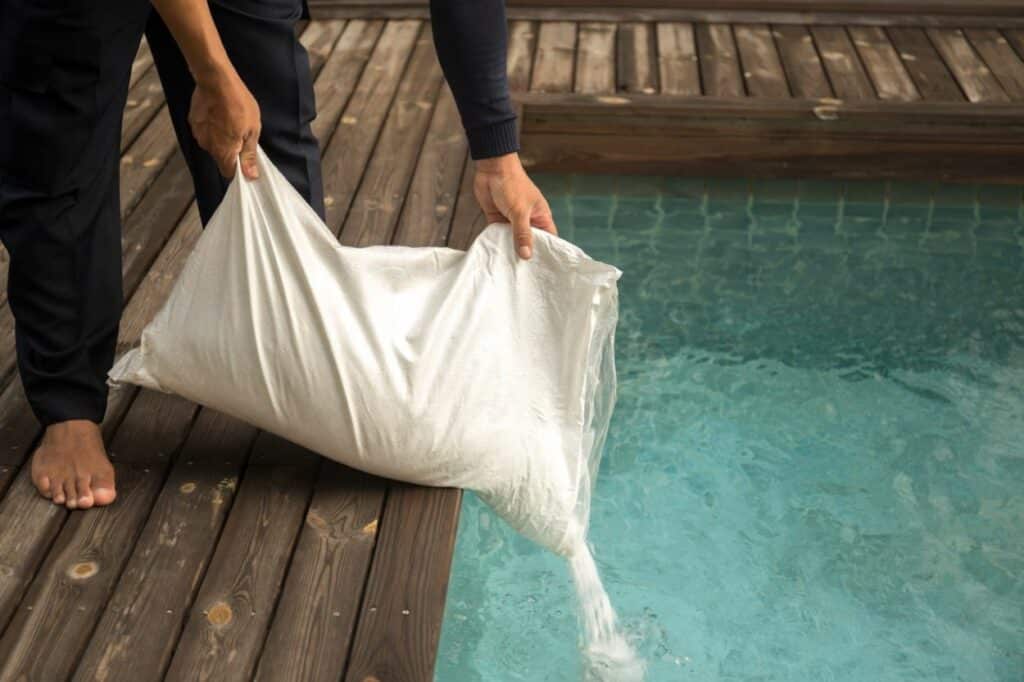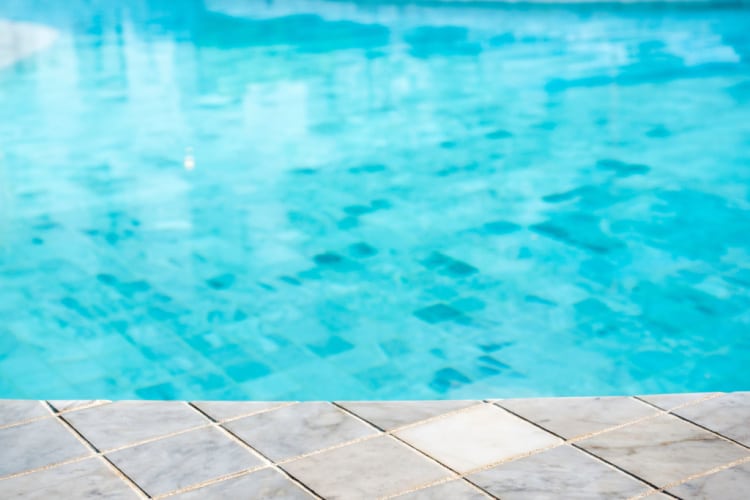Pool chemistry is a lot more complicated than most people assume. There are automatic filters and plenty of different testing kits that can make the job a lot easier, but there’s still a lot of work and a surprising amount of math involved in the upkeep of your swimming pool.
This is especially true if you live in an area with hard water and need to soften it before you can swim in it. Luckily, you can easily soften the water and make it ready to be used by simply using water softener salts or your water softener.

How to Soften Pool Water
You can soften your pool water in two ways: water softeners and water softener salt. Both methods have their advantages and disadvantages, and we’ll cover them all so you can make a good decision.
Use Water Softener Salt in Pool

Adding water softener salt to your swimming pool is a bit tricky because there’s no exact measurement for it. The amount of salt you add will vary depending on the hardness levels of the water and, of course, how much water your pool holds. Salt will take at least 3-4 days to change the pool water balance.
This means that adding the salt will be a gradual process that includes adding a small bucket of salt at a time, waiting for a few days, testing the water, and repeating the process for as long as necessary.
We’ll go over the exact hardness that you’ll want to achieve in the section below, but you don’t want the water to be too soft, so it’s not a good idea to add too much salt. Putting in too much salt can also damage the pool if it takes too long to dissolve, so if you think you might have been too heavy-handed, brushing the pool floor can help the salt dissolve faster.
Additionally, while water softener water can be used in pools, you’ll need to ensure that it’s pure salt and white without any manganese or iron. These components can stain the floor of your pool, so you’ll want to check the bags to ensure that the salt you’re using is clean.
After you’ve added the salt and a few days have passed, you’re going to test the water and see if the hardness has gone down. Aside from the testing strips, you can usually tell if the water is hard or if the salt still isn’t dissolved by whether or not the pool is cloudy. If the water is relatively clear, then the pool is at least approaching the proper softness levels.
Get a Salt-based Water Softener
The simpler method to soften the water in your pool is to simply use a water softener like the Springwell. This method is a lot simpler since there are no measurements and no heavy bags of salt that you need to lug around.
You use the water softener simply by connecting a hose up to the tank and letting it slowly fill up your pool. The amount of time that this will take will depend on the model of water softener that you have, but if you take our recommendation and get a Springwell, then you can expect between 11 and 20 GPM (gallons per minute), which is pretty quick.
The only downside of this method is that it’ll come out too soft, and you’ll need to add calcium chlorine to get the water hardness levels within the recommended parameters.
The Acceptable Water Hardness Level for Swimming Pool
There are generally two units of measurement for water hardness, called ppm and GPG, which stands for parts per million and grains per gallon, respectively. They both have different values and most swimming pool testing kits test for one or the other, so we’ll tell you both values to cover all the bases.
It’s ridiculous how many different opinions there are on the ideal water hardness levels online, but we think that the Cambridge Water Department has the most reliable numbers.
What you’ll want to be aiming for is hardness levels somewhere between 60 and 120 ppm and 3.5 to 7.0 GPG, which is generally referred to as moderately hard water.
There’s always a bit of leeway when it comes to the numbers, but straying too far above or below can cause serious problems in your pool.
For example, if you go over 180 ppm and 10.5 GPG, the water becomes so hard that it starts to cause scaling on the pool tiles and material buildup in the pool filter components. On the other hand, water that’s below 20 ppm and 1.0 GPG doesn’t contain enough calcium, so it’ll start taking it from the tiles in concrete pools.
How to Test Swimming Pool Water Hardness
In order to determine pool water hardness, you need a water hardness testing kit, which usually comes in strips.
The strips have a line on them and a chart with colors. Once you stick the strip in the water, you’ll wait for a bit, and once the line turns a specific color, you’ll find the color on the chart, and it’ll tell you the approximate hardness of your pool water.
There are also other hardness testing kits, such as the Hofun water test kit, or the eXact test kit, but they’re usually more expensive so people tend to stick with the strips.
Benefits of Soft Water in Pool

Soft water is a lot better for your swimming pool filters as it doesn’t cause material buildup in the pool and filter components. Hard water speeds up the buildup of limescale on the pool walls and creates a sort of discoloration on the tiles in the form of a thin film of slime.
The calcium and magnesium in heavy water can be beneficial for your skin in moderate amounts. Still, the heavy minerals can also lead to a lot of skin irritation and dry hair, and hard water is notoriously difficult to wash off as well. Soft water is a lot less damaging to the skin.
Soft water doesn’t benefit your skin, but it allows you to spend as much time as you want in your pool without worrying about your skin itching afterward.
Unfortunately, as we’ve mentioned before, soft water can also damage a pool. The water will naturally sap calcium from pool tiles and cause them to start crumbling over time.
However, as long as you stick to ppm values between 60 and 120, the calcium properties of the water should be just right, and it should be ideal for swimming without damaging the pool itself. Soft water can be balanced by simply adding a bit of calcium chlorine.
If you have a fiberglass pool, you don’t have to worry about soft water since there are no tiles that can be corroded.
In our opinion, balancing out the calcium levels in soft water is a lot better than getting your pool and your skin damaged by the harsh levels of metal chemicals in heavy water, so soft water is the better choice for swimming water.
Conclusion
Ideally, you’ll want to keep your pool water hardness levels in the 60 and 120 ppm and 3.5 to 7.0 GPG sweet spot for the ideal swimming environment.
The best way you can do that is to either manually add pure water softener salt one bucket at a time to your pool to reduce the hardness or by using a water softener and then raising the calcium levels slightly by adding some calcium chlorine.
We go into a lot more detail on the procedures in the article itself, but both of them are effective and relatively easy to implement, so pick whichever one suits you more.